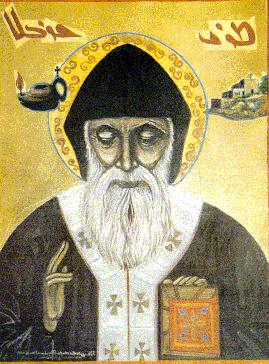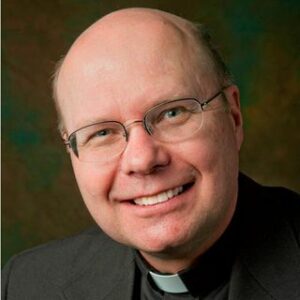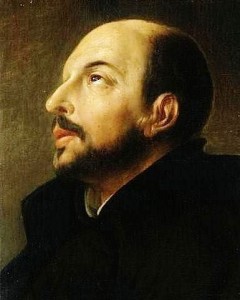Prayers and Chaplet for St. Charbel
Saint Charbel was born on May 8, 1828, from a modest Maronite family in Bekaa Kafra, a village in North Lebanon. He entered the order of Lebanese monks in 1851 and was ordained a priest in 1859. Later he withdrew to the hermitage of Saints Peter and Paul to spend 23 years in prayer, fasting, manual labor, and penance until on Christmas Eve of the year 1898 he piously gave back his soul to God. Aged 70 years. After his death, many graces and bodily cures have been obtained through his intercession. He was canonized by His Holiness Paul VI in 1977.
For more visit his Discerning Hearts St. Charbel page
Chaplet
Podcast: Play in new window | Download (Duration: 7:27 — 6.8MB) | Embed
Subscribe: Apple Podcasts | Spotify | Amazon Music | Android | Pandora | iHeartRadio | JioSaavn | Podchaser | Gaana | Podcast Index | Email | TuneIn | Deezer | Anghami | RSS | More
THE CHAPLET
The chaplet is made up of five sets of beads, three red, one white and one blue. Five black beads, divide the sets. A medal of the saint connects the beads, with a single white bead following the medal and preceding the five sets.
The red beads are for the vows of poverty, chastity and obedience, the virtues by which religious share in the Passion of Christ.
The white beads represent the Holy Eucharist, and the blue beads love and devotion to Our Blessed Mother.
ORDER OF RECITATION
On the first white bead after the medal say the “Father of Truth” prayer. On each black bead recite an “Our Father”.
On the first three red beads say the “Hail Mary” in honor of Saint Charbel’s fidelity to the vow of poverty.
On the second set of red beads say the “Hail Mary” in honor of Saint Charbel’s fidelity to the vow of chastity.
On the third set of red beads say the “Hail Mary” in honor of Saint Charbel’s fidelity to the vow of obedience.
On the three white beads say the “Hail Mary” in honor of Saint Charbel’s love for the Eucharist.
On the three blue beads say the “Hail Mary” in honor of Saint Charbel’s devotion to Our Blessed Mother. Conclude with the prayer to obtain graces on the medal.
Father of Truth Prayer
Father of Truth, behold Your Son, a sacrifice pleasing to You. Accept this offering of Him who died for me; behold His blood shed on Golgotha for my salvation. It pleads for me. For His sake, accept my offering. Many are my sins, but greater is Your mercy. When placed on a scale, Your mercy prevails over the weight of the mountains known only to You. Consider the sin and consider the atonement; the atonement is greater and exceeds the sin. Your beloved Son sustained the nails and the lance because of my sins so in His sufferings You are satisfied and I live.
Prayer to Obtain Graces
Lord, infinitely holy and glorified in Your saints, You have inspired Charbel, the saint monk, to lead the perfect life of a hermit. We thank You for granting him the blessing and the strength to detach himself from the world so that the heroism of the monastic virtues of poverty, chastity, and obedience might triumph in his hermitage. We beseech You to grant us the grace of loving and serving You, following his example. Almighty God, who have manifested the power of Saint Charbel’s intercession through his countless miracles and favors, grant us this grace (here mention your intention) which we request from You through his intercession. Amen.
the music found in the Chaplet is from Sister Marie Keyrouz’s CD
Other Prayers
Lord, infinitely Holy and Glorified in Your Saints,
You have inspired Charbel, the saint monk,
to lead the perfect life of a hermit.
We thank You for granting him the blessing
and the strength to detach himself from the world
so that the heroism of the monastic virtues of poverty,
obedience, and chastity,
could triumph in his hermitage.
We beseech You to grant us the grace of loving and serving You,
following his example.
Almighty God, Who has manifested
the power of St. Charbel’s intercession
through his countless miracles and favours,
grant us…
(State your intention(s) here…)
through his intercession.
Amen.
Our Father…
Hail Mary…
Glory Be…
2.
O God of Silence, in stillness Your adorable and mysterious Trinity lives, loves and acts. In the silence of  time, Your great Mysteries have been accomplished. Blessed is the one who quiets everything within himself and listens to the impelling voice which leads to You. Charbel heard this voice and closed himself in solitude. He separated himself from a self-seeking world and spoke with You. You taught him to deny himself and to die, like the grain of wheat. You asked him to bind himself to You in a life of poverty, chastity and obedience. Freed from himself, he discovered You, 0 Lord, embraced the way of the Cross and filled his spirit with the memory of Your Son’s passion and death. The holy Mysteries became his life, the Eucharist his real food and the Mother of God his consolation. Day and night he sought You in the Scriptures and in the lives of the saints. Through unending prayer his whole life became a living hymn of praise to You and ended in a sacrifice of love that continues to proclaim Your glory. We beseech You, through his intercession, to inspire us to a life of prayer and sacrifice. Help us to live lives of quiet dedication to the service of Your Church, forever.
time, Your great Mysteries have been accomplished. Blessed is the one who quiets everything within himself and listens to the impelling voice which leads to You. Charbel heard this voice and closed himself in solitude. He separated himself from a self-seeking world and spoke with You. You taught him to deny himself and to die, like the grain of wheat. You asked him to bind himself to You in a life of poverty, chastity and obedience. Freed from himself, he discovered You, 0 Lord, embraced the way of the Cross and filled his spirit with the memory of Your Son’s passion and death. The holy Mysteries became his life, the Eucharist his real food and the Mother of God his consolation. Day and night he sought You in the Scriptures and in the lives of the saints. Through unending prayer his whole life became a living hymn of praise to You and ended in a sacrifice of love that continues to proclaim Your glory. We beseech You, through his intercession, to inspire us to a life of prayer and sacrifice. Help us to live lives of quiet dedication to the service of Your Church, forever.
Amen



 Fr. James Kubicki S.J. – A Heart on Fire on Inside the Pages with Kris McGregor
Fr. James Kubicki S.J. – A Heart on Fire on Inside the Pages with Kris McGregor



 From the NAB Gospel: Luke 1:26-38
From the NAB Gospel: Luke 1:26-38



